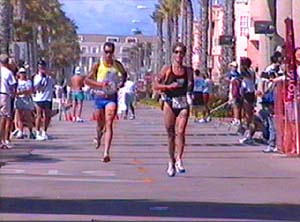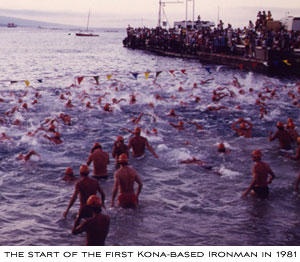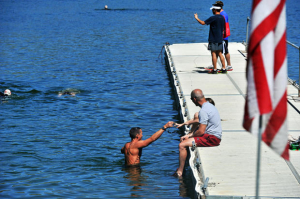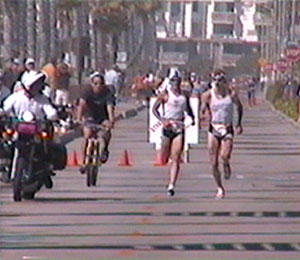
This is a special skill, and I don't have it. Getting volunteers requires asking people to do work essentially for nothing, and because I don't like to work for nothing I assume no one else does either. So it's hard for me to ask.
But there are people more giving than I who enjoy helping others without expectation of financial reward on the other end. I suspect people who like to be volunteers are good at getting volunteers, because they aren't asking people to do something they wouldn't do themselves.
You need a person like this to work with you, and this is near to the first person you'd need to find for your race committee (a subject we'll tackle in our very next installment).
How many volunteers do you need? There is no formula that fits, because the number hinges on the complexity of your race, its distance, and the amenities you provide. Me? When I put on races I used to provide a lot of amenities. A lot of post-race food, for example. Therefore, I'd need a lot of volunteers, because you need people to execute every amenity.
Select your race committee, which includes a person in charge of the venue (setting up the start/finish, etc.) and a bike course coordinator, and so forth. Have them report back to you quickly how many volunteers they'll need. By "quickly" I'm saying I'd like to have that information six to ten months before the race. Then have your volunteer coordinator go to work rounding up the people these other coordinators need.
There are pure volunteers, and then there are quasi-volunteers. As for the former, these people just like to help. Imagine that. How do you find these golden properties? There are various strategies that will serve you both in building your race entries and in getting volunteers.
You need to market your race, for example, and the biggest part of that is pounding the pavement, talking to tri clubs, stuff like that. And of course you'll have online registration. While speaking to tri clubs, and for online registration (and on your own race's website) don't forget to ask for volunteers. Everywhere you go to ask for entries, of course, but also ask for volunteers.
This goes for media as well. Getting local media to cover your race is not that hard, and pre-race coverage is the most important element of that. This is a great time to ask for volunteers. Just always have volunteers on your mind, whenever you're addressing anyone, including the media. Even when you're talking to the city about permits, etc., query them about volunteers. Do they have an employee newsletter? Can they include a blurb about being a volunteer for the event?
Then there are quasi-volunteers, that is, people who'll work for free individually, but the organization gets a donation. It might seem counter-intuitive to have the cost of volunteers as part of your race budget, but it was always part of mine. Like $500 or $1000. This is because you can get some high-quality volunteers in exchange for a donation. In some cases these might offset a much higher charge. For example, there are often youth organizations that are trained at, among other things, traffic control. I would ask the city police who they'll accept for controlling traffic at intersections. They'll tell you what organizations generally do a good job at this, and would be acceptable to them. Perhaps police cadets, or volunteer law enforcement. There are often organizations whose sole function is traffic control, and they'll do it for a donation to the cause.
Then there are local athletic teams, such as high school track or cross-country teams, or swim teams, that'll work aid stations for a donation of $100 or $200 to their general team fund. Consider the lodges and civic organizations, the Elks, Rotary, and so forth.
Just be cognizant of one thing. There are "high quality" volunteers and there are the others. Should you get Rotarians, you probably get people who can work on your construction crew. Should you get kids, you get volunteers who'll man aid stations. You don't want to put critical tasks in the hands of a those who aren't up to the job.
If you're wise (and perhaps calculating) in your choice of a race charity, this can be the biggest source of volunteers. If you select a charity with tentacles into a large base of supporters, this might solve your volunteer needs in one fell swoop. How many volunteers could you get out of a cancer foundation; the Red Cross; the SPCA; the Sierra Club; or foundations or organizations tasked for any number of diseases or causes? Who knows? Just be specific with such groups. "I'll select you as my charity, and I'll do thus and so for you, but in exchange I must have 400 volunteers who'll work on these dates. Are you quite comfortable your organization can provide this?" Something like that.
Alternatively, there are three-way deals that can be made. It's frequent for larger companies — banks and financial institutions, for example — to pick such a charity to support as an act of corporate goodwill. Let us say your event raises money to fight autism, diabetes, or illiteracy. Ask such an organization if it has corporate partners with a lot of locally based employees. I would consider presenting to that partner a sponsorship opportunity that would cost it no money. The consideration for such sponsor designation would be the provision of volunteers.
Of course, you might get lucky. What if such a company is a supermarket chain? You might find certain other benefits accrue to you through such an arrangement.



